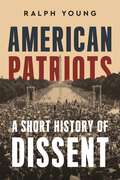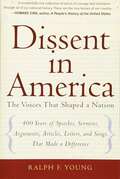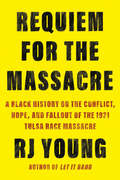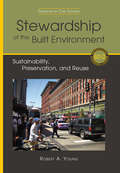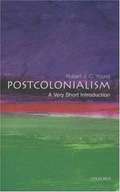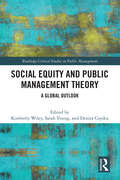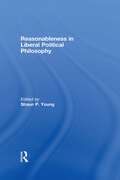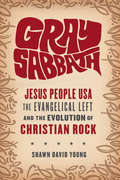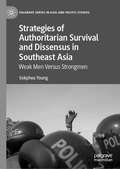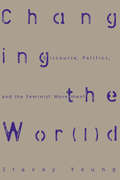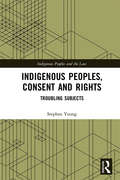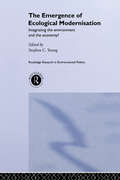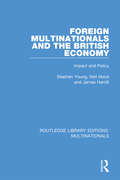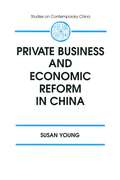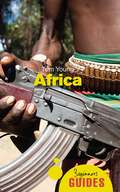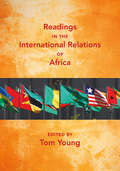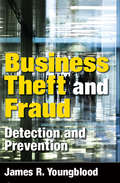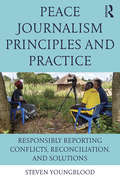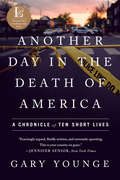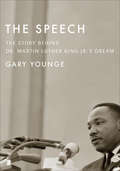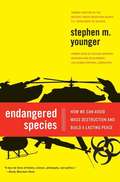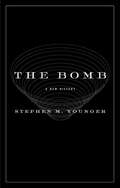- Table View
- List View
American Patriots: A Short History of Dissent
by Ralph YoungA concise history that proves that dissent is patrioticThe history of America is a history of dissent. Protests against the British Parliament’s taxation policies led to the American Revolution and the creation of the United States. At the Constitutional Convention the founders put the right to protest in the First Amendment of the Bill of Rights. In the nineteenth century, dissenters protested against the War of 1812 and the Mexican War, they demanded the abolition of slavery, suffrage for women, and fair treatment for workers. In the twentieth century, millions of Americans participated in the Civil Rights Movement, the antiwar movement, and second-wave feminism. In the twenty-first century, hundreds of thousands protested the war in Iraq, joined the 2011 Occupy movement, the 2017 Women’s March, and the 2020 Black Lives Matter uprisings. The crowds grew larger than ever, but the sentiments expressed were familiar. There have been dissenting Americans for as long as there has been an America.In American Patriots, historian Ralph Young chronicles the key role dissent has played in shaping the United States. He explains that activists are not protesting against America, but pushing the country to live up to its ideals. As he guides the reader through the history of protest, Young considers how ordinary Americans, from moderates to firebrands, responded to injustice. He highlights the work of organizations like SNCC and ACT UP, and he follows iconic individuals like Ida B. Wells-Barnett and Woody Guthrie, charting the impact of their dissent. Some of these protesters are celebrated heroes of American history, while others are ordinary people, frequently overlooked, whose stories show that change is often accomplished through grassroots activism.Yet not all dissent is equal. In 2021, thousands of rioters stormed the US Capitol, and Americans on both sides of the aisle watched the destruction with horror. American Patriots contrasts this attack with the long history of American protest, and challenges us to explore our definition of dissent. Does it express a legitimate grievance or a smokescreen for undermining democracy? What are the limits of dissent? Where does dissent end and sedition begin?In a time when legitimate dissent is framed as unpatriotic, Young reminds us of the dissenters who have shaped our country’s history. American Patriots is a necessary defense of our right to demand better for ourselves, our communities, and our nation.
Dissent In America: Voices That Shaped A Nation
by Ralph F. YoungThis collection of primary sources presents the story of US History as told by dissenters who, throughout the course of American history, have fought to gain rights they believed were denied to them or others, or who disagree with the government or majority opinion. Each document is introduced by placing it in its historical context, and thought-provoking questions are provided to focus the student when s/he reads the text. Instructors are at liberty to choose the documents that best highlight a theme they wish to emphasize.
Requiem for the Massacre: A Black History on the Conflict, Hope, and Fallout of the 1921 Tulsa Race Massac re
by RJ YoungLonglisted for the Reading the West Book AwardsNAACP Image Award Nominee for Outstanding Literary Work - Non-FictionWith journalistic skill, heart, and hope, Requiem for the Massacre reckons with the tension in Tulsa, Oklahoma, one hundred years after the most infamous act of racial violence in American historyMore than one hundred years ago, the city of Tulsa, Oklahoma, perpetrated a massacre against its Black residents. For generations, the true story was ignored, covered up, and diminished by those in power and in a position to preserve the status quo. Blending memoir and immersive journalism, RJ Young shows how, today, Tulsa combats its racist past while remaining all too tolerant of racial injustice.Requiem for the Massacre is a cultural excavation of Tulsa one hundred years after one of the worst acts of domestic terrorism in U.S. history. Young focuses on unearthing the narrative surrounding previously all-Black Greenwood district while challenging an apocryphal narrative that includes so-called Black Wall Street, Booker T. Washington, and Black exceptionalism. Young provides a firsthand account of the centennial events commemorating Tulsa's darkest day as the city attempts to reckon with its self-image, commercialization of its atrocity, and the aftermath of the massacre that shows how things have changed and how they have stayed woefully the same.As Tulsa and the United States head into the next one hundred years, Young&’s own reflections thread together the stories of a community and a nation trying to heal and trying to hope.
Stewardship of the Built Environment
by Robert A YoungWhen we think of green building, we tend to picture new construction. But Robert A. Young argues that the greenest building is often the one that has already been built. In Stewardship of the Built Environment, he shows how retrofitting existing structures holds untapped potential for achieving sustainable communities. Stewardship of the Built Environment explores the social, environmental, and economic benefits of reuse-from the societal value of reusing existing buildings to financial incentives available for refurbishment. Readers will become familiar with essential terminology; sustainability and historic preservation metrics; government oversight processes; and opportunities for smart growth afforded by rehabilitation. This knowledge is key to preserving the past while building a sustainable future.
Federal Property Policy in Canadian Municipalities
by Robert A. Young Michael C. IrchaFederal property issues - especially those involving divestiture - create political disputes at all levels of government. Federal Property Policy in Canadian Municipalities analyzes the emergence of many of these issues involving military bases, airports, and other facilities in communities across Canada. With careful analysis the contributors show the underlying patterns and causes of these conflicts and their resolutions while emphasizing intergovernmental relations and the social forces that are active in property issues. Contributors examine general federal policy as well as issues pertinent to British Columbia, the Toronto waterfront, New Brunswick, and Newfoundland and Labrador. The unprecedented number of cases discussed in these essays provides general conclusions and recommendations for a new orientation that will take local interests and preferences into account from the outset of decision-making. Public property is an understudied field of public policy, particularly as it concerns municipal government. Federal Property Policy in Canadian Municipalities presents a comprehensive treatment of federal property, changes in policy, and the effects these changes have on various levels of government. Contributors include Jeff Braun-Jackson (Memorial University of Newfoundland), Pierre Filion (University of Waterloo), Michael C. Ircha (University of New Brunswick), Leonard Wade Locke (Memorial University of Newfoundland), Robert MacKinnon (University of New Brunswick in Saint John), Kurt Peacock (University of New Brunswick in Saint John), Christopher Sanderson (Government of Manitoba), Tracy Summerville (University of Northern British Columbia), Stephen Tomblin (Memorial University of Newfoundland), Gary N. Wilson (University of Northern British Columbia), John Young (University of Northern British Columbia), and Robert A. Young (University of Western Ontario).
Postcolonialism: A Very Short Introduction
by Robert J. C. YoungPostcolonialism explores the political, social, and cultural effects of decolonization, continuing the anti-colonial challenge to western dominance. This lively and innovative account of both the history and key debates of postcolonialism discusses its importance as an historical condition, and as a means of changing the way we think about the world. Key concepts and issues are considered, with reference to particular cultural and historical examples, such as the status of aboriginal people, cultural nomadism, Western feminism, the innovative fiction of Garcia Marquez and Salman Rushdie, and the postcolonial cities of London, Bombay and Cairo. The work of theorists such as Homi Bhabha, Edward Said, Frantz Fanon, and Gayatri Spivak are woven into the discussion, making this fascinating subject relevant and accessible to a wider audience.
How Australia Decides
by Sally YoungIn recent years, the Australian media have come under fire for their reporting of politics and election campaigns. Political reporting is said to be too influenced by commercial concerns, too obsessed with gossip and scandal, and too focused on trivia and 'sound bites' at the expense of serious issues. There are accusations of bias, sensationalism, 'lazy' journalism and 'horse-race' reporting that is obsessed with opinion polls. How Australia Decides is the first book to put these allegations to the test. Based on a four-year empirical study, Sally Young reports the results of the only systematic, historical and in-depth analysis of Australian election reporting. This groundbreaking book shows how election reporting has changed over time, and how political news audiences, news production and shifts in political campaigning are influencing media content, Ai with profound implications for Australian democracy.
Social Equity and Public Management Theory: A Global Outlook (ISSN)
by Sarah Young Denita Cepiku Kimberly WileySocial equity is a pillar of public service. Thus, social equity should be a central concern in public management in practice and scholarship. However, widespread incorporation and reflection of social equity practices in government and the anticipated public benefits still seem like an elusive goal. The ability to analytically assess social equity is the first step toward prescribing social equity reforms. Public affairs graduate programs, like a master’s in public administration or public policy, often teach public management separately from social equity. This book empirically and theoretically bridges social equity and public management for use in the public affairs graduate classroom. The book highlights international research that leverages public management theory to build reasonable social equity measures and applications. The research highlighted in the text includes studies from across countries in North and South America, Europe, Southeast Asia, and Australia. This is the first book specifically designed for global public affairs classrooms that connects public management theory and practice with social equity reforms.
Reasonableness in Liberal Political Philosophy
by Shaun P. YoungPreviously published as a special issue of the Critical Review of Social and Political Philosophy, this collection offers a thought-provoking critique of the role of the concept of reasonableness in liberal political theory, focusing on the proposed relationship between reasonableness and the establishment and preservation of a just and stable liberal polity.The essays explore the explicit and implicit use of the idea of reasonableness, presenting an analysis that incorporates normative and empirical observations and employs a number of different analytical approaches, including liberalism, feminism, environmentalism, Marxism, and communitarianism. This unique book provides in a single volume a critique that engages not only a vast array of issues but also a diversity of critical perspectives. It not only rectifies a deficiency in the existing scholarship, but also addresses the issues of socio-political justice and stability, offering new, insightful critiques that respond to the increasingly complex circumstances and conflicts that confront life in contemporary pluralistic societies. Reasonableness in Liberal Political Philosophy will be a valuable resource for those interested in liberal political theory and its potential usefulness in helping to secure a just and stable polity.
Gray Sabbath: Jesus People USA, the Evangelical Left, and the Evolution of Christian Rock
by Shawn YoungFormed in 1972, Jesus People USA is an evangelical Christian community that fundamentally transformed the American Christian music industry and the practice of American evangelicalism, which continues to evolve under its influence. In this fascinating ethnographic study, Shawn David Young replays not only the growth and influence of the group over the past three decades but also the left-leaning politics it developed that continue to serve as a catalyst for change.Jesus People USA established a still-thriving Christian commune in downtown Chicago and a ground-breaking music festival that redefined the American Christian rock industry. Rather than join "establishment" evangelicalism and participate in what would become the megachurch movement, this community adopted a modified socialism and embraced forms of activism commonly associated with the New Left. Today the ideological tolerance of Jesus People USA aligns them closer to liberalism than to the religious right, and Young studies the embodiment of this liminality and its challenge to mainstream evangelical belief. He suggests the survival of this group is linked to a growing disenchantment with the separation of public and private, individual and community, and finds echoes of this postmodern faith deep within the evangelical subculture.
Strategies of Authoritarian Survival and Dissensus in Southeast Asia: Weak Men Versus Strongmen (Palgrave Series in Asia and Pacific Studies)
by Sokphea YoungThis book analyses how authoritarian rulers of Southeast Asian countries maintain their durability in office, and, in this context, explains why some movements of civil society organizations succeed while others fail to achieve their demands. It discusses the relationship between the state-society-business in the political survival context. As the first comparative analysis of strategies of regime survival across Southeast Asia, this book also provides an in-depth insight into the various opposition movements, and the behaviour of antagonistic civic and political actors in the region.
Changing the Wor(l)d: Discourse, Politics and the Feminist Movement
by Stacey YoungChanging the Wor(l)d draws on feminist publishing, postmodern theory and feminist autobiography to powerfully critique both liberal feminism and scholarship on the women's movement, arguing that both ignore feminism's unique contributions to social analysis and politics. These contributions recognize the power of discourse, the diversity of women's experiences, and the importance of changing the world through changing consciousness. Young critiques social movement theory and five key studies of the women's movement, arguing that gender oppression can be understood only in relation to race, sexuality, class and ethnicity; and that feminist activism has always gone beyond the realm of public policy to emphasize improving women's circumstances through transforming discourse and consciousness. Young examines feminist discursive politics, critiques social science methodology, and proposes an alternative approach to understanding the women's movement.
Indigenous Peoples, Consent and Rights: Troubling Subjects (Indigenous Peoples and the Law)
by Stephen YoungAnalysing how Indigenous Peoples come to be identifiable as bearers of human rights, this book considers how individuals and communities claim the right of free, prior and informed consent (FPIC) as Indigenous peoples. The basic notion of FPIC is that states should seek Indigenous peoples’ consent before taking actions that will have an impact on them, their territories or their livelihoods. FPIC is an important development for Indigenous peoples, their advocates and supporters because one might assume that, where states recognize it, Indigenous peoples will have the ability to control how non-Indigenous laws and actions will affect them. But who exactly are the Indigenous peoples that are the subjects of this discourse? This book argues that the subject status of Indigenous peoples emerged out of international law in the late 1970s and early 1980s. Then, through a series of case studies, it considers how self-identifying Indigenous peoples, scholars, UN institutions and non-government organizations (NGOs) dispersed that subject-status and associated rights discourse through international and national legal contexts. It shows that those who claim international human rights as Indigenous peoples performatively become identifiable subjects of international law – but further demonstrates that this does not, however, provide them with control over, or emancipation from, a state-based legal system. Maintaining that the discourse on Indigenous peoples and international law itself needs to be theoretically and critically re-appraised, this book problematises the subject-status of those who claim Indigenous peoples’ rights and the role of scholars, institutions, NGOs and others in producing that subject-status. Squarely addressing the limitations of international human rights law, it nevertheless goes on to provide a conceptual framework for rethinking the promise and power of Indigenous peoples’ rights. Original and sophisticated, the book will appeal to scholars, activists and lawyers involved with indigenous rights, as well as those with more general interests in the operation of international law.
The Emergence of Ecological Modernisation: Integrating the Environment and the Economy? (Environmental Politics #1)
by Stephen C. YoungThe Emergence of Ecological Modernisation offers a wealth of empirical research material from an international perspective, bringing together previously scattered sources for the first time. It addresses a series of theoretical issues that are of key contemporary relevance, such as the relationship between ecological modernisation and sustainable development; strategies for promoting ecological modernisation, and the extent to which it is possible to 'green' contemporary capitalism.
Foreign Multinationals and the British Economy: Impact and Policy (Routledge Library Editions: Multinationals)
by Stephen Young Neil Hood James HamillThis book, first published in 1988, examines the impact of multinational companies on the British economy and the British government’s policy responses. It assesses the effects of multinationals both on the national economy and on different regions and evaluates the benefits and problems brought by overseas companies. It looks at how government has attempted to entice multinationals to invest, and the UK government’s success in these attraction efforts as compared with other countries. Regulatory aspects of policy are also reviewed and evaluated, and consideration is given to possible new policy approaches. This title will be of interest to students of business studies.
Private Business and Economic Reform in China (Studies In Contemporary China)
by Susan YoungBased on Party and state documents, Chinese newspaper reports and surveys, the Chinese and Western scholarly literature and the author's own fieldwork, this important study examines the private sector as a case study of the mechanics of reform in China, emphasizing the relationships among local officials, private businesses, and central policy. The book traces the growth of private business in China since 1978 and focuses on the interaction between private sector policy and other reforms and examines how this has affected China's political economy.
Africa: A Beginner's Guide (Beginner's Guides)
by Tom YoungVast, diverse, dynamic, and turbulent, the true nature of Africa is often obscured by its poverty-stricken image. In this controversial guide, Tom Young cuts through the emotional hype to critically analyse the continent's political history and the factors behind its dismal economic performance. Maintaining that colonial influences are often overplayed, Young argues that much blame must lie with African governments themselves and that Western aid has often caused more harm than good.
Readings in the International Relations of Africa
by Tom YoungThese readings in international relations in Africa grapple with the continent's changing place in the world. The essays confront issues such as the increasing tempo of armed conflict, the tendency of Western states and agencies to intervene in African settings, the presence of China, and the health of African states and their ability to participate in the global economy. Questions regarding sovereignty, leading regional actors, conflict and resolution, and the neoliberal African renaissance add to the broad thematic coverage presented in this timely volume.
We Need to Talk About Africa: The harm we have done, and how we should help
by Tom YoungIf you boil a kettle twice today, you will have used five times more electricity than a person in Mali uses in a whole year. How can that be possible? Decades after the colonial powers withdrew Africa is still struggling to catch up with the rest of the world. When the same colonists withdrew from Asia there followed several decades of sustained and unprecedented growth throughout the continent. So what went wrong in Africa? And are we helping to fix it, or simply making matters worse? In this provocative analysis, Tom Young argues that so much has been misplaced: our guilt, our policies, and our aid. Human rights have become a cover for imposing our values on others, our shiniest infrastructure projects have fuelled corruption and our interference in domestic politics has further entrenched conflict. Only by radically changing how we think about Africa can we escape this vicious cycle.
Business Theft and Fraud: Detection and Prevention
by James R. YoungbloodBusiness Theft and Fraud: Detection and Prevention offers a broad perspective on business-related theft, providing a detailed discussion of numerous avenues of theft, including internal and external fraud, organized retail crime, mortgage fraud, cyber fraud, and extortion. Combining current research and the author’s extensive experience with loss prevention and security, this professional text identifies industry trouble areas and offers techniques to combat business theft, such as how to identify sales underreporting, track sales by shifts, and educate employees on computer-related fraud. This publication is critical for those involved with loss prevention, security, or criminal justice. Business Theft and Fraud’s accessible, franchise-oriented scope will help many professionals identify and thwart threats in the evolving business world.
Peace Journalism Principles and Practices: Responsibly Reporting Conflicts, Reconciliation, and Solutions
by Steven YoungbloodLong-time peace journalist Steven Youngblood presents the foundations of peace journalism in this exciting new textbook, offering readers the methods, approaches, and concepts required to use journalism as a tool for peace, reconciliation, and development. Guidance is offered on framing stories, ethical treatment of sensitive subjects, and avoiding polarizing stereotypes through a range of international examples and case studies spanning from the Iraq war to the recent unrest in Ferguson, Missouri. Youngblood teaches students to interrogate traditional media narratives about crime, race, politics, immigration, and civil unrest, and to illustrate where—and how—a peace journalism approach can lead to more responsible and constructive coverage, and even assist in the peace process itself.
Another Day in the Death of America: A Chronicle of Ten Short Lives
by Gary YoungeWINNER OF THE 2017 J. ANTHONY LUKAS PRIZE <P>On an average day in America, seven children and teens will be shot dead. In Another Day in the Death of America, award-winning journalist Gary Younge tells the stories of the lives lost during one such day. <P> It could have been any day, but he chose November 23, 2013. <P>Black, white, and Latino, aged nine to nineteen, they fell at sleepovers, on street corners, in stairwells, and on their own doorsteps. <P>From the rural Midwest to the barrios of Texas, the narrative crisscrosses the country over a period of twenty-four hours to reveal the full human stories behind the gun-violence statistics and the brief mentions in local papers of lives lost. <P>This powerful and moving work puts a human face-a child's face-on the "collateral damage" of gun deaths across the country. This is not a book about gun control, but about what happens in a country where it does not exist. What emerges in these pages is a searing and urgent portrait of youth, family, and firearms in America today.
The Speech: The Story Behind Dr. Martin Luther King Jr.'s Dream
by Gary YoungeMARTIN LUTHER KING JR. DELIVERED his powerful "I Have a Dream" speech on August 28, 1963. Fifty years later, the speech endures as a defining moment in the civil rights movement. It continues to be heralded as a beacon in the ongoing struggle for racial equality.This gripping book is rooted in new and important interviews with Clarence Jones, a close friend of and draft speechwriter for Martin Luther King Jr., and Joan Baez, a singer at the march, as well as Angela Davis and other leading civil rights leaders. It brings to life the fascinating chronicle behind "The Speech" and other events surrounding the March on Washington. Younge skillfully captures the spirit of that historic day in Washington and offers a new generation of readers a critical modern analysis of why "I Have a Dream" remains America's favorite speech._________"It was over eighty degrees when Martin Luther King Jr. took the stage at the Lincoln Memorial in 1963. King was the last speaker. By the time he reached the podium, many in the crowd had started to leave. Not all those who remained could hear him properly, but those who could stood rapt. 'Go back to Mississippi, go back to Alabama, go back to South Carolina, go back to Georgia, go back to Louisiana, go back to the slums and ghettos of our northern cities, knowing that somehow this situation can andwill be changed,' said King as though he were wrapping up. 'Let us not wallow in the valley of despair, I say to you today, my friends.' Then he set his prepared text aside. [Clarence] Jones saw his stance turn from lecturer to preacher. He turned to the person next to him: 'Those people don't know it but they're about to go to church.' A smattering of applause filled a pause more pregnant than most. 'So even though we face the difficulties of today and tomorrow, I still have a dream.'"-from the introduction
Endangered Species
by Stephen M. YoungerA former nuclear weapons designer, Stephen M. Younger understands, as few others can, humankind's potential for violence. He knows that the proliferation of weapons of mass destruction means that any nation, group, or even individual could cause unimaginable carnage--and the accelerating pace of communications and transportation means that things can happen faster than we can think about them. In Endangered Species, Younger peers into the heart of modern civilization to present a practical plan for ending mass violence, the scourge of our times and a threat to our survival as a species. Looking across our knowledge of psychology, history, politics, and technology, Younger presents a convincing argument that we can escape our spiral into global destruction. But we haven't a moment to lose.
The Bomb: A New History
by Steven M. Younger“Younger has provided an insightful guide, especially for the general reader, into today’s array of nuclear powers and their capabilities.”—James Schlesinger, former Secretary of Defense and Secretary of Energy, former Director of Central IntelligenceIn The Bomb, Stephen Younger, former Los Alamos weapons designer and author of Endangered Species, provides a new history of the making of nuclear policy and the creation of the most terrible weapons humankind has ever possessed. In an era when rogue nations like North Korean and Iran strive to create their own precarious weapons programs, Younger’s The Bomb provides much-needed background and insight for students, policy makers, and readers who wish to better understand the important issues involving nuclear weapons and national security.
